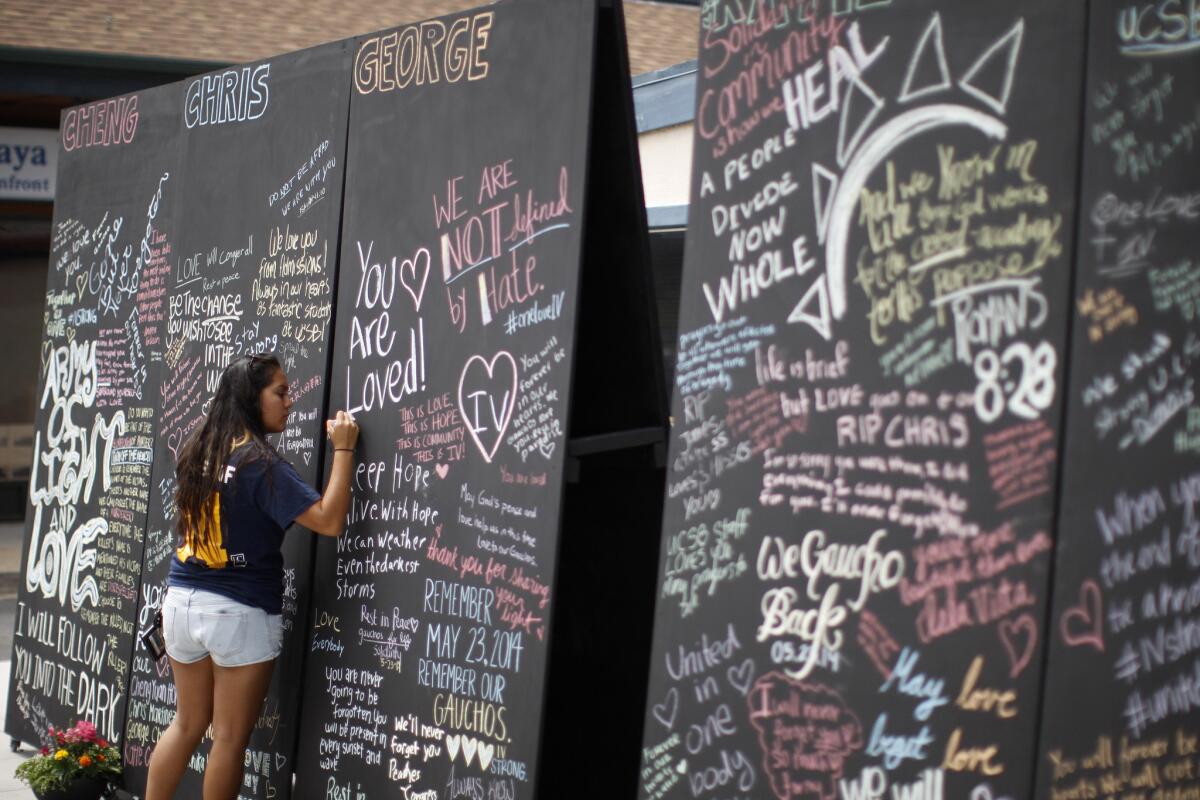Column: Misogyny and the co-opting of the Isla Vista tragedy

Since Elliot Rodger’s deadly rampage in Isla Vista, we’ve heard the usual discussions. We’ve heard rants about spoiled rich kids (Rodger drove a BMW) and the alienating affects of video games (he was a “World of Warcraft” aficionado). We’ve heard about mental health policies and, of course, gun control.
No talking point, however, has proved nearly as tenacious or tendentious as the misogyny angle. According to this narrative, and based on his videos and writings, Rodger committed his crimes because he hated women for not sleeping with him. And he responded to rejection with hate because of a culture of male privilege that tells men they are entitled to sex. That culture exists because our society is rooted in a fundamentally patriarchal ethos.
And so on. Never mind that four of the dead (five if you count Rodger) were men. Never mind that he had been in treatment for social and psychological issues since he was a child, presumably long before he became interested in unattainable blond coeds. In the media, especially social media, the conversation has been less about the victims, female and otherwise, than female victimization in general.
On Twitter, the hashtag #YesAllWomen, which aims to show the wide spectrum of harassment and discrimination women encounter daily , has become a viral sensation. Some examples are overtly disturbing: “Because even a taped confession admitting to raping me wasn’t enough to put him in jail.” Others show how certain self-protective measures taken by women are so subtle and ingrained, we often barely notice we’re taking them: “Because ‘I have a boyfriend’ is more likely to get a guy to back off than ‘no.’”
The fact that all women maintain a built-in wariness of some men is absolutely worthy of discussion. But is it really the discussion we should be having around the Isla Vista tragedy? Does a “culture of misogyny” explain Rodger’s actions any more than a culture (or subculture, at least) of survivalist technophobia explained the Unabomber’s actions or an “epidemic of bullying” sent the Columbine killers over the edge?
A lot of people seem to think this is a no-brainer — that a man who writes an angry manifesto against women and then goes on a killing spree is, pure and simple, a misogynist committing a hate crime. But Rodger, like just about every perpetrator of a massacre, was not just profoundly troubled but profoundly alienated. His problem wasn’t rejection as much as it was separation.
A man who won’t leave a woman alone at a bar unless she says she has a boyfriend may be hewing to a culture of male entitlement, but that’s just it — he’s hewing, asserting his membership in that culture. Rodger, from what we know, belonged to no group. For all his privilege, he was the opposite of entitled. He was someone with nothing left to lose.
That’s not as hashtag- or headline-friendly as concepts like rape culture or gun culture or mental health reform, even if Isla Vista doesn’t fall neatly into any of these categories. Not only was Rodger not a rapist, his desperation to be loved by women suggests that he didn’t even objectify them as much as idealize them to an intolerably painful degree. He shouldn’t have had access to guns. But he killed with knives as well as with guns obtained legally in a state with strict weapons laws. And though he proved more dangerous than anyone realized, he’d hardly been deprived of mental health services in his life.
It’s human nature to attempt to assign meaning to tragedy, and the more senseless the tragedy, the more inclined we are to impose teachable moments on what would otherwise be incomprehensible atrocities. But the lesson of Isla Vista, at least so far, may be that there’s not all that much to learn, there’s not all that much that could have been done.
As frustrating as that is, it must be even more frustrating, even infuriating, for the family members of victims to watch their personal tragedy be co-opted into a rallying cry for women who, whatever injustice or violation they’ve suffered at the hands of men, still happen not to have been murdered by one.
Yes, all women have the right to tell their stories. But that doesn’t mean #YesAllWomen should piggyback on someone else’s.
More to Read
A cure for the common opinion
Get thought-provoking perspectives with our weekly newsletter.
You may occasionally receive promotional content from the Los Angeles Times.







